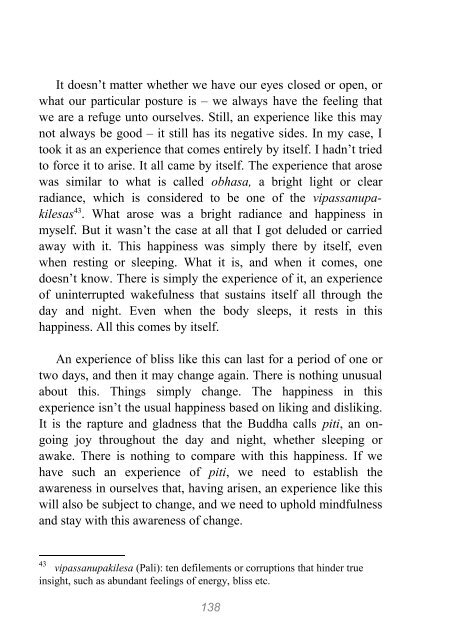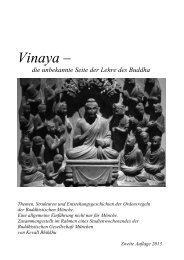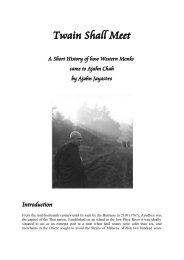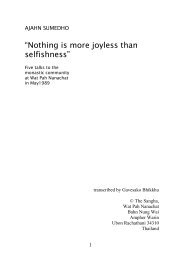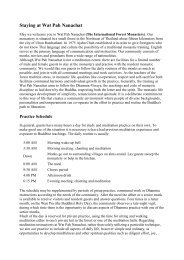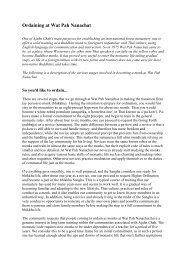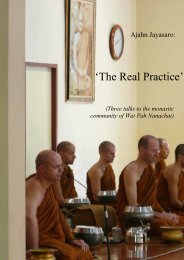Luang Por Liem: The Ways of the Peaceful - Wat Pah Nanachat
Luang Por Liem: The Ways of the Peaceful - Wat Pah Nanachat
Luang Por Liem: The Ways of the Peaceful - Wat Pah Nanachat
Create successful ePaper yourself
Turn your PDF publications into a flip-book with our unique Google optimized e-Paper software.
It doesn’t matter whe<strong>the</strong>r we have our eyes closed or open, or<br />
what our particular posture is – we always have <strong>the</strong> feeling that<br />
we are a refuge unto ourselves. Still, an experience like this may<br />
not always be good – it still has its negative sides. In my case, I<br />
took it as an experience that comes entirely by itself. I hadn’t tried<br />
to force it to arise. It all came by itself. <strong>The</strong> experience that arose<br />
was similar to what is called obhasa, a bright light or clear<br />
radiance, which is considered to be one <strong>of</strong> <strong>the</strong> vipassanupakilesas<br />
43 . What arose was a bright radiance and happiness in<br />
myself. But it wasn’t <strong>the</strong> case at all that I got deluded or carried<br />
away with it. This happiness was simply <strong>the</strong>re by itself, even<br />
when resting or sleeping. What it is, and when it comes, one<br />
doesn’t know. <strong>The</strong>re is simply <strong>the</strong> experience <strong>of</strong> it, an experience<br />
<strong>of</strong> uninterrupted wakefulness that sustains itself all through <strong>the</strong><br />
day and night. Even when <strong>the</strong> body sleeps, it rests in this<br />
happiness. All this comes by itself.<br />
An experience <strong>of</strong> bliss like this can last for a period <strong>of</strong> one or<br />
two days, and <strong>the</strong>n it may change again. <strong>The</strong>re is nothing unusual<br />
about this. Things simply change. <strong>The</strong> happiness in this<br />
experience isn’t <strong>the</strong> usual happiness based on liking and disliking.<br />
It is <strong>the</strong> rapture and gladness that <strong>the</strong> Buddha calls piti, an ongoing<br />
joy throughout <strong>the</strong> day and night, whe<strong>the</strong>r sleeping or<br />
awake. <strong>The</strong>re is nothing to compare with this happiness. If we<br />
have such an experience <strong>of</strong> piti, we need to establish <strong>the</strong><br />
awareness in ourselves that, having arisen, an experience like this<br />
will also be subject to change, and we need to uphold mindfulness<br />
and stay with this awareness <strong>of</strong> change.<br />
43 vipassanupakilesa (Pali): ten defilements or corruptions that hinder true<br />
insight, such as abundant feelings <strong>of</strong> energy, bliss etc.<br />
138


